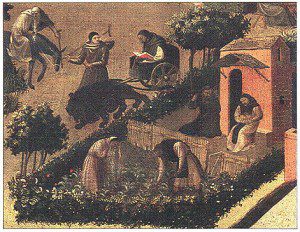 The latest thing conservative evangelicals on social media are getting excited about and sharing around is the newly discovered phenomenon of celibate gay people. There are even celibate gay people who live together as a couple and just don’t have sex. One couple named Lindsey and Sarah shared their story on this blog a few months ago. Though I completely reject using celibate gay people as bludgeons against sexually active gay people, I do think that celibacy in general is something the church should be doing a lot more to support. One of the greatest sins of the Protestant church which has caused all sorts of secondary problems in Western civilization has been our denigration of celibate monastic life as a vocation and our idolatry of marriage and the nuclear family. What if instead of attacking gay people, our congregations actually made lifelong celibacy into a viable option in our culture by establishing (and funding!) monastic communities as the prayerful core of our life together?
The latest thing conservative evangelicals on social media are getting excited about and sharing around is the newly discovered phenomenon of celibate gay people. There are even celibate gay people who live together as a couple and just don’t have sex. One couple named Lindsey and Sarah shared their story on this blog a few months ago. Though I completely reject using celibate gay people as bludgeons against sexually active gay people, I do think that celibacy in general is something the church should be doing a lot more to support. One of the greatest sins of the Protestant church which has caused all sorts of secondary problems in Western civilization has been our denigration of celibate monastic life as a vocation and our idolatry of marriage and the nuclear family. What if instead of attacking gay people, our congregations actually made lifelong celibacy into a viable option in our culture by establishing (and funding!) monastic communities as the prayerful core of our life together?
After my experience of four years overseeing the membership process of a suburban United Methodist congregation, I feel confident hypothesizing that the greatest threat to the church today is neither the “gay agenda” nor the “persecution” of wedding cake bakers, but rather the powerful hidden idolatry promoted by so-called “family values.” I’m not just saying that to take the progressive side of the culture war. What I’ve seen in the suburban church in terms of the attendance data I’ve analyzed and the relationships I’ve had with dozens of families has led me to conclude that, more than anything else, the suffocating moralistic consumerism of our nuclear family-idolizing culture is what’s most responsible for destroying the American church. People aren’t playing hooky from church because of the wishy-washy theology of the preacher. They can’t even hear whether it’s good or bad theology because their parenting to-do lists are drowning out the sermon.
The church has been a major accomplice in two very toxic claims that our society makes: 1) you cannot be happy until you find the one soulmate that you’re supposed to spend your life with, 2) once you find this soulmate, you’re supposed to have kids and then earn as much money as you possibly can to save up for their college tuition while also devoting all your free time to your kids’ extracurricular activities so they can start writing their Harvard admission essays when they’re in kindergarten. Think about it: almost all the programming we design to attract people to our churches is built around the assumption that life is about finding a mate (a.k.a. singles ministry) and raising children (a.k.a. family life ministry). It’s okay to be single as long as you haven’t given up hope that God has somebody special just for you.
It’s true that many of the young adults who disappear from church in our twenties go back when our kids are little, but church almost always happens through the filter of parental duty. It’s something we do to raise our kids right along with the scouts and the soccer and everything else. When our kids are growing up, we play triage with soccer practice and play rehearsals and scout camping trips in making the weekly decision of whether or not to go to church. When our kids graduate and leave our homes, then it’s hard for us to figure out what to do at church because the whole time we went, we were there as parents. The most common demographic of absentees in the church membership database I oversaw were recent empty-nesters.
I should be clear that I really only know the story of middle-class white people like me who represent the “ideal” norm that is projected onto our society. There was a minivan commercial about a decade ago that captures the frantic, exhausting life of the suburban nuclear family quite well. An obnoxiously campy song plays in the background while they move in fast-forward, shuttling back and forth between sports activities and school and going to the beach where a whale jumps through the middle of the van because it has automatic doors that can open on both sides. They’re smiling and dancing around through every frantic task. And it’s clear that their lives revolve completely around parenting which is the lifestyle that half of the commercials on TV have a vested interest in hypnotizing into us (the other half are about sex, or the importance of making yourself attractive to a mate).
Buying stuff for your significant other and your kids covers most of the consumerism that capitalism depends on. Since you’re buying stuff for other people, it becomes an “unselfish” moralistic duty. Doesn’t your wife deserve a shiny new diamond now that you’ve been married for 10 years? If you really love your kids and went them to get ahead, shouldn’t you invest in this gadget, buy this parenting self-help book, send them to this summer camp, etc? Marriage and the nuclear family are how capitalism organizes our consumerism and guilt-trips us into buying stuff.
The apostle Paul anticipated our cultural predicament in 1 Corinthians 7 when he promoted celibacy as a vocation for those who had the gift: “I want you to be free from anxieties. The unmarried man is anxious about the affairs of the Lord, how to please the Lord; but the married man is anxious about the affairs of the world, how to please his wife, and his interests are divided” (1 Corinthians 7:32-34). Anxiety is the pandemic of middle-class white culture today, and nothing feeds our anxiety more than the dual terrors of failing to provide for our families financially and failing to raise our kids correctly as parents. These dual terrors create the careerism and moralistic consumerism that push our shoulders into the grindstone that keeps of our capitalist economy running. But they are killing us and destroying our church.
Imagine how different our church’s witness to the world would be if each congregation’s core membership were a group of maybe a dozen single celibate people who lived together as a intentional community and could devote themselves to a daily rhythm of prayer and service to the community because the rest of the congregation paid for their living expenses. This is kind of like what the Roman Catholics and Eastern Orthodox have been doing for centuries, though their religious orders aren’t necessarily hitched to particular congregations.
Of course the celibate religious vocation among Catholics and Orthodox has really suffered in recent years in Western culture due to our idolatry of marriage and the nuclear family. It’s always a very reassuring thing for me when I’m at a Catholic mass and I see a nun who’s somewhat close to my age rather than 75 or whatever the median age of Catholic religious are today. I always want to walk over and say a big personal thank you. Because she’s doing something that nobody does anymore, and I sense that at least some of the beautiful holy mystery that soaks every Catholic mass I’ve been to is a direct result of the nuns who give their lives to praying the hours every day for the sake of the church.
What if each congregation were built around a family of people who were married to God and whose sacred vocation were paid for by those whose vocation is to be in the world pursuing a traditional career, marriage, and family? Just because the world has idolized marriage and the nuclear family in order to make the capitalist grindstone turn doesn’t mean that raising a family is an illegitimate vocation. It’s supposed to be a sacred vocation, and it would be much more sacred if it were constantly influenced and cross-pollinated by the vocation of a celibate family of people at the center of our Christian communities who were directing their time and erotic energy into a life of radical intimacy with God.
Because of the way I interpret the supposedly anti-gay clobber verses in scripture, I believe that people throughout the spectrum of sexual orientation and gender identity can be called to either chaste married life or celibacy. Celibacy is a sacred gift, not a punishment. Sexuality is also a gift to be treasured by gay and straight people alike. We desperately need more celibates who understand celibacy not as a negation of their cursed identity but a centrally important role in the life of the church. The only way this will happen is if we have congregations who promote the vocation of celibacy to the point of actually putting their money where their mouth is. If church members actually tithed 10% instead of our reported average of 2.5%, then even hundred member congregations could pay for a small monastery at their core.
I was just interrupted from writing this by an hour-long conversation with a presumably homeless man who knocked on our door looking for work and the opportunity to turn his life around. One of the things he said in sharing his life story was that he’d once really hoped to have the “good life” with a wife and family, but he had thrown so many years away that now it was too late. It broke my heart to hear him say that. Every time I talk with homeless people who are asking for help, I hate the fact that I can’t just adopt them into my family.
What would happen if homeless people knocked on the doors of congregations that were acclimated to subsidizing the communal life of a monastery of people? What if when our congregations got visited by people who have fallen off the conveyor belt of normal capitalist family life, who have decade-sized gaping holes in their resumes, who have to check “yes” in the felony box on job applications, they could be taken in and nurtured by a monastic family? Because of the nuclear family-idolized shape of our society, all that we can do for the homeless people who visit our churches is give them a bag of non-perishable food items they can’t really use without a working kitchen and then kick them back out into the pinball machine of overtaxed, under-resourced social service agencies.
Yeah, it’s a crazy idea for every congregation to have a monastery. But it seems like a kingdom kind of idea to me. Regarding the celibacy thing, I wouldn’t say that you have to be sexually celibate to live monastically. The irony is I’m mostly celibate even though I’m married due to the pressures of parenting and the way that I survive my lifestyle to the degree that I do is through ascetic monastic practices like fasting and contemplative prayer. Promoting a monastic rhythm of life is a centerpiece of my vision for our campus ministry here in New Orleans. Our battle against the colonization of the church by the world’s idols is only as strong as our commitment to a life of prayer. Within this battle, those called to a life of celibacy should have their vocations honored and worked into the church budget.












